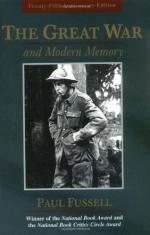
|
| Name: _________________________ | Period: ___________________ |
This test consists of 15 multiple choice questions and 5 short answer questions.
Multiple Choice Questions
1. What author writes showing the use of an elegy based on the pastoral?
(a) Siegfried Sassoon.
(b) Edmund Blunden.
(c) Wilfred Owens.
(d) Herbert Read.
2. In "Exposure," where are the men freezing?
(a) Forest.
(b) Trenches.
(c) Barracks.
(d) Homes.
3. In "Oh What a Literary War," the literature of the time is alive with _____.
(a) Realism.
(b) Allusion.
(c) Beauty.
(d) Imagination.
4. In "But It Still Goes On," who do the men develop crushes on?
(a) Other soldiers.
(b) All answers are correct.
(c) Civilians.
(d) Officers.
5. What does the speaker at an elegy become aware of?
(a) His own creativity.
(b) His own mortality.
(c) His own sensitivity.
(d) His own empathy.
6. At what age did Robert Grave's enter the military?
(a) Eighteen.
(b) Nineteen.
(c) Sixteen.
(d) Twenty.
7. What type of bird is associated with dawn?
(a) Robins.
(b) Nightingales.
(c) Eagles.
(d) Larks.
8. "Death was denoted as going west, going out of it, or going under." Fussell uses these to show examples of _____.
(a) Aliteration.
(b) Equivocation.
(c) Allusion.
(d) Euphemism.
9. Class distinctions applied in the military also as class determined their positions where?
(a) No answers are correct.
(b) Battle.
(c) Rank.
(d) Service.
10. Who does Fussell mention is a very popular author of the time?
(a) George Sherston.
(b) Thomas Hardy.
(c) Siegfried Sassoon.
(d) Evelyn Waugh.
11. After Graves is released from the hospital the second time, where does Graves spend the remainder of the war?
(a) Scotland.
(b) England.
(c) France.
(d) Germany.
12. What type of bird is associated with sunset?
(a) Nightingales.
(b) Eagles.
(c) Robins.
(d) Larks.
13. Where does Graves study English literature?
(a) Harvard.
(b) Oxford.
(c) Yale.
(d) Berkely.
14. Fussell demonstrates the troops making a vocabulary that developed and they used in everyday life. What word was used to refer to passing units on the road?
(a) Bugger.
(b) Old Jerry.
(c) Etaples.
(d) Idiot Crossroads.
15. Pastoral allusion is good in getting across what point?
(a) Creativity.
(b) Imagination.
(c) Prayer.
(d) Irony.
Short Answer Questions
1. Pilgrim's Progress is mentioned quite a bit with its references and allusions to _____.
2. Who was Robert Graves Lieutenant when he joins the First Battalion?
3. When Graves recovers, he returns to his unit. Where is his unit stationed?
4. The eighteen square mile enclosure in which troops were trapped and subject to shelling from all sides is Fussell's example of _____.
5. Who allowed the publication of Wilfred Owen's works after his death?
|
This section contains 370 words (approx. 2 pages at 300 words per page) |

|




